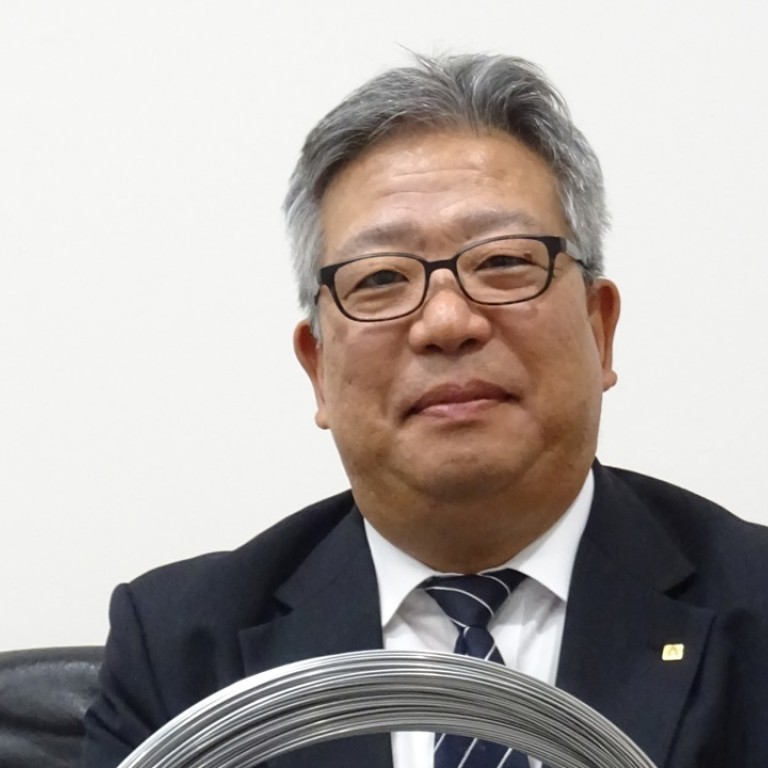
ALMINE stands out with hardest aluminium alloys
Japanese alloy manufacturer claims to produce the world’s hardest aluminium alloy wires and bars, and expects higher global demand for lighter, stronger parts for electric vehicles
[Country Business Reports interviews and articles by Discovery Reports www.discoveryreports.com]
Any company can fabricate aluminium alloys, but Japanese firm ALMINE stands out with its capacity to manufacture ultra-strong alloys to suit the special requirements of diverse industries, from high-rise construction to aerospace.
“We produce the hardest aluminium alloy wires and bars in the world,” says Takeshi Takeuchi, who replaced his father as president of ALMINE in 2014. “This distinct quality of our products sets us apart from our competitors.”
At the forefront of aluminium innovation, ALMINE has dedicated much time and research to maximise the metal’s potentials. ALMINE’s product development programme, which is one of the best in the world, has developed aluminium alloys such as its own duralumin concoction. Used in airframe fabrication and other safety-sensitive products, duralumin combines aluminium with copper, manganese and magnesium to produce an exceptionally hard aluminium alloy.
ALMINE also claims to be the only company in the world that manufactures two-tonne aluminium wires that have no joints from end to end. With diameters ranging from 9.5mm to 50mm, the seamless feature of the aluminium wire lends the product its superior strength.
ALMINE uses its continuous casting and rolling method, especially designed by Takeshi’s father, who is a machine engineer. Using an automatic tilting machine carefully calibrated for the whole production process, the continuous casting and rolling method ensures that only the precise amount of molten aluminium is poured into the production line. As such, ALMINE does not need to reheat the aluminium raw material, thus cutting the company’s CO2 emission by as much as only a third of the traditional process. The machinery also ensures that the aluminium molecules are dispersed evenly across the whole cross section of the wires. This feature prevents cracks and bends, a crucial safety requirement for aeroplane components.
“China is evolving and is starting to use better quality materials. With our rich experience in this regard, ALMINE is ready to support companies in China that require our products”
All ISO-certified, ALMINE’s three manufacturing facilities in Japan and another one in Vietnam adhere to the highest levels of quality. Sophisticated testing equipment from laser micrometres to X-ray machines ensure that all other ALMINE products such as aluminium bars and sheets are fabricated to the highest standards required by global giants such as Toyota, Honda and Nissan.
Moving forward, ALMINE envisions growing its client base as it further innovates and treads uncharted territory. The company has established a management building and research section within the Osaka plant to develop new materials to support future technologies. ALMINE engineers at the Osaka facility have developed a special aluminium coating formula that can make steel last for more than 100 years without corroding. This is twice longer than the lifespan of steel traditionally coated with zinc. Such constant focus on innovation has helped the company earn the trust of industry leaders from a wide range of verticals. The coating innovation, for instance, opens up exciting opportunities for the company from the construction sector in the United States, Europe and Asia.
ALMINE sees its market expanding also with the global trend towards a greener environment. In particular, the company expects higher demand for lighter yet stronger aluminium parts to support the booming demand for electric vehicles worldwide.
“Using more aluminium components in the production line will greatly satisfy manufacturers that are seriously pursuing green policies,” Takeuchi says. “Aluminium is easy and inexpensive to recycle while its scrap value is exceptionally high compared to steel and other metals.”
One of the strongest drivers of ALMINE’s growth, however, will likely come from Chinese companies that are moving towards upgrading their quality standards.
“China is evolving and is starting to use better quality materials,” Takeuchi says. “With our rich experience in this regard, ALMINE is ready to support companies in China that require our products.”

